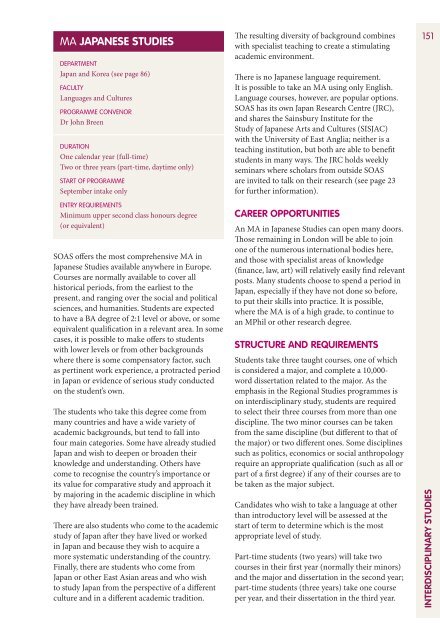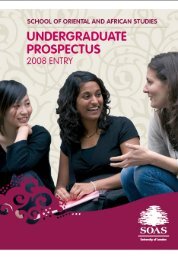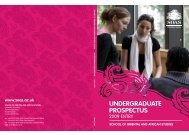POSTGRADUATE PROSPECTUS
POSTGRADUATE PROSPECTUS
POSTGRADUATE PROSPECTUS
- No tags were found...
You also want an ePaper? Increase the reach of your titles
YUMPU automatically turns print PDFs into web optimized ePapers that Google loves.
MA JAPANESE STUDIESDEPARTMENTJapan and Korea (see page 86)FACULTYLanguages and CulturesPROGRAMME CONVENORDr John BreenDURATIONOne calendar year (full-time)Two or three years (part-time, daytime only)START OF PROGRAMMESeptember intake onlyENTRY REQUIREMENTSMinimum upper second class honours degree(or equivalent)SOAS offers the most comprehensive MA inJapanese Studies available anywhere in Europe.Courses are normally available to cover allhistorical periods, from the earliest to thepresent, and ranging over the social and politicalsciences, and humanities. Students are expectedto have a BA degree of 2:1 level or above, or someequivalent qualification in a relevant area. In somecases, it is possible to make offers to studentswith lower levels or from other backgroundswhere there is some compensatory factor, suchas pertinent work experience, a protracted periodin Japan or evidence of serious study conductedon the student’s own.The students who take this degree come frommany countries and have a wide variety ofacademic backgrounds, but tend to fall intofour main categories. Some have already studiedJapan and wish to deepen or broaden theirknowledge and understanding. Others havecome to recognise the country’s importance orits value for comparative study and approach itby majoring in the academic discipline in whichthey have already been trained.There are also students who come to the academicstudy of Japan after they have lived or workedin Japan and because they wish to acquire amore systematic understanding of the country.Finally, there are students who come fromJapan or other East Asian areas and who wishto study Japan from the perspective of a differentculture and in a different academic tradition.The resulting diversity of background combineswith specialist teaching to create a stimulatingacademic environment.There is no Japanese language requirement.It is possible to take an MA using only English.Language courses, however, are popular options.SOAS has its own Japan Research Centre (JRC),and shares the Sainsbury Institute for theStudy of Japanese Arts and Cultures (SISJAC)with the University of East Anglia; neither is ateaching institution, but both are able to benefitstudents in many ways. The JRC holds weeklyseminars where scholars from outside SOASare invited to talk on their research (see page 23for further information).CAREER OPPORTUNITIESAn MA in Japanese Studies can open many doors.Those remaining in London will be able to joinone of the numerous international bodies here,and those with specialist areas of knowledge(finance, law, art) will relatively easily find relevantposts. Many students choose to spend a period inJapan, especially if they have not done so before,to put their skills into practice. It is possible,where the MA is of a high grade, to continue toan MPhil or other research degree.STRUCTURE AND REQUIREMENTSStudents take three taught courses, one of whichis considered a major, and complete a 10,000-word dissertation related to the major. As theemphasis in the Regional Studies programmes ison interdisciplinary study, students are requiredto select their three courses from more than onediscipline. The two minor courses can be takenfrom the same discipline (but different to that ofthe major) or two different ones. Some disciplinessuch as politics, economics or social anthropologyrequire an appropriate qualification (such as all orpart of a first degree) if any of their courses are tobe taken as the major subject.Candidates who wish to take a language at otherthan introductory level will be assessed at thestart of term to determine which is the mostappropriate level of study.Part-time students (two years) will take twocourses in their first year (normally their minors)and the major and dissertation in the second year;part-time students (three years) take one courseper year, and their dissertation in the third year.151INTERDISCIPLINARY STUDIES








